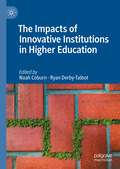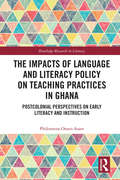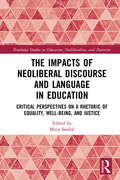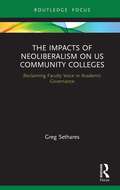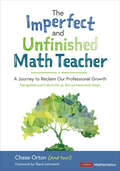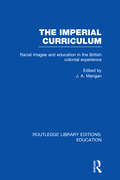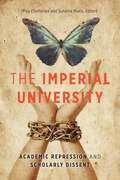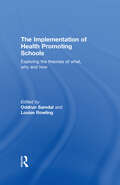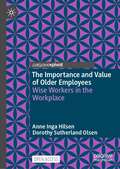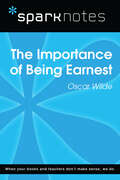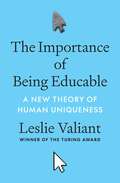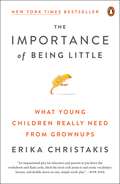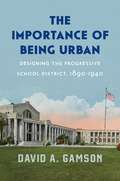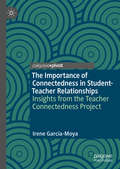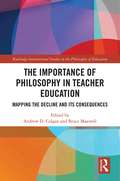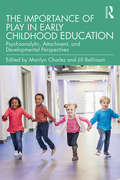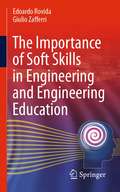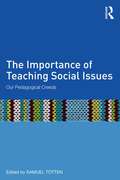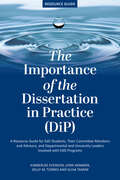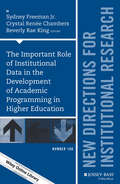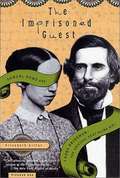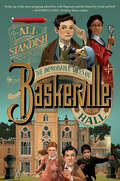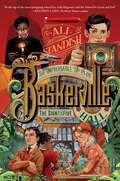- Table View
- List View
The Impacts of Innovative Institutions in Higher Education
by Noah Coburn Ryan Derby-TalbotAs they have done historically, innovative institutions enrich the college ecosystem, helping the higher educational industry develop flexible resilience. The chapters in this book showcase perspectives, hard-won lessons, challenges and provocative ideas about how historically innovative institutions can contribute to the current discourse on innovation in higher education. The chapters in this book include case studies of innovative campuses and practices, as well as future-looking directions for innovation. Taken together, they ask, is there a way to consider how future trends can be navigated in effective ways, so that the most important features of higher education––student learning, the liberal arts, the cultivation of critical thinking––can remain central to tomorrow’s institutions?
The Impacts of Language and Literacy Policy on Teaching Practices in Ghana: Postcolonial Perspectives on Early Literacy and Instruction (Routledge Research in Literacy)
by Philomena Osseo-AsareThis text critically examines changes in Ghanaian language and literacy policy following independence in 1957 to consider its impacts on early literacy teaching. By adopting a postcolonial theoretical perspective, the text interrogates the logic behind policy changes which have prioritised English, local language, or biliteracy. It draws on data from interviews with teachers and researcher observation to demonstrate how policies have influenced teaching and learning. Dr Osseo-Asare’s findings inform the development of a conceptual framework which highlights the socio-cultural factors that impact the literacy and biliteracy of young children in Ghana, offering solutions to help teachers combat the challenges of frequent policy changes. This timely monograph will prove to be an essential resource not only for researchers working on education policies, teacher education, and English-language learning in postcolonial Ghana but also for those looking to identify the thematic and methodological nuances of studying literacy and education in postcolonial contexts.
The Impacts of Neoliberal Discourse and Language in Education: Critical Perspectives on a Rhetoric of Equality, Well-Being, and Justice (Routledge Studies in Education, Neoliberalism, and Marxism)
by Mitja SardočThis edited collection combines quantitative content and critical discourse analysis to reveal a shift in the rhetoric used as part of the neoliberal agenda in education. It does so by analysing, uncovering, and commenting on language as a central tool of education. Focussing on vocabulary, metaphors, and slogans used in strategy documents, advertising, policy, and public discourse, the text illustrates how concepts such as justice, opportunity, well-being, talent, and disadvantage have been hijacked by educational institutes, governments, and universities. Showing how neoliberalism has changed discourses about education and educational policy, these chapters trace issues such as anti-intellectualism, commercialization, meritocracy, and an erasure of racial difference back to a contradictory growth in egalitarian rhetoric. Given its global scope, this volume offers a timely intervention in the studies of neoliberalism and education by developing a holistic vision of how the language of neoliberalism has changed how we think about education. It will prove to be an essential resource for scholars and researchers working at the intersections of education, policymaking, and neoliberalism.
The Impacts of Neoliberalism on US Community Colleges: Reclaiming Faculty Voice in Academic Governance (Routledge Studies in Education, Neoliberalism, and Marxism)
by Greg SetharesFocusing on community colleges as a unique structure within American higher education, this text investigates the specific ways in which these institutions have been impacted by a global increase in neoliberal education policies. Analyzing the effects neoliberalism has had on community colleges, the text charters discourse relating the erosion of faculty voice in academic governance, and decision making; the vocationalization of curriculum; and the impact that these factors have had on the ability of community colleges to provide students with an education that supports a democratic society. Exposing a movement away from the historical aims of community-based education, the text evidences a hijacking of community colleges to serve the objectives of the corporate elite. There has been a decline in community college faculty engagement in shared governance and their loss of recognition as academic and curricular leaders, and the book discusses the potential for redistribution of decision-making power back toward faculty. This text will be of great interest to graduate and postgraduate students, academics, professionals and policy-makers in the fields of Higher Education, Education Policy and Politics, Sociology of Education, Higher Education Management and Education Politics.
The Imperfect and Unfinished Math Teacher [Grades K-12]: A Journey to Reclaim Our Professional Growth (Corwin Mathematics Series)
by Chase OrtonThe system won’t do it for us. But we have each other. In The Imperfect and Unfinished Math Teacher: A Journey to Reclaim Our Professional Growth, master storyteller Chase Orton offers a vulnerable and courageous grassroots guide that leads K-12 math teachers through a journey to cultivate a more equitable, inclusive, and cohesive culture of professionalism for themselves…what he calls professional flourishment. The book builds from two bold premises. First, that as educators, we are all naturally imperfect and unfinished, and growth should be our constant goal. Second, that the last 40 years of top-down PD efforts in mathematics have rarely supplied teachers with what they need to equitably grow their practice and foster classrooms that are likewise empowered, inclusive, and cohesive. With gentle humanity, this book inspires teachers to break down silos, observe each others’ classrooms, interrogate their own biases, and put students at the center of everything they do in the math classroom. This book: Weaves raw and authentic stories—both personal and those from other educators—into a relatable and validating narrative Offers interactive opportunities to self-reflect, build relationships, seek new vantage on our teaching by observing others’ classrooms and students, and share and listen to other’s stories and experiences Asks teachers to give and accept grace as they work collaboratively to better themselves and the system from within, so that they can truly serve each of their students authentically and equitably Implementing the beliefs and actions in this book will position teachers to become more active partners in each other’s professional growth so that they can navigate the obstacles in their professional landscape with renewed focus and a greater sense of individual and collective efficacy. It equips teachers—and by extension, their students—to chart their own course and author their own equitable and joyful mathematical and professional stories.
The Imperfect and Unfinished Math Teacher [Grades K-12]: A Journey to Reclaim Our Professional Growth (Corwin Mathematics Series)
by Chase OrtonThe system won’t do it for us. But we have each other. In The Imperfect and Unfinished Math Teacher: A Journey to Reclaim Our Professional Growth, master storyteller Chase Orton offers a vulnerable and courageous grassroots guide that leads K-12 math teachers through a journey to cultivate a more equitable, inclusive, and cohesive culture of professionalism for themselves…what he calls professional flourishment. The book builds from two bold premises. First, that as educators, we are all naturally imperfect and unfinished, and growth should be our constant goal. Second, that the last 40 years of top-down PD efforts in mathematics have rarely supplied teachers with what they need to equitably grow their practice and foster classrooms that are likewise empowered, inclusive, and cohesive. With gentle humanity, this book inspires teachers to break down silos, observe each others’ classrooms, interrogate their own biases, and put students at the center of everything they do in the math classroom. This book: Weaves raw and authentic stories—both personal and those from other educators—into a relatable and validating narrative Offers interactive opportunities to self-reflect, build relationships, seek new vantage on our teaching by observing others’ classrooms and students, and share and listen to other’s stories and experiences Asks teachers to give and accept grace as they work collaboratively to better themselves and the system from within, so that they can truly serve each of their students authentically and equitably Implementing the beliefs and actions in this book will position teachers to become more active partners in each other’s professional growth so that they can navigate the obstacles in their professional landscape with renewed focus and a greater sense of individual and collective efficacy. It equips teachers—and by extension, their students—to chart their own course and author their own equitable and joyful mathematical and professional stories.
The Imperial Curriculum: Racial Images and Education in the British Colonial Experience (Routledge Library Editions: Education)
by J. A. ManganThis volume presents the first comparative analysis of racial attitudes in the formal schooling of both Britain and its former dominions and colonies. The various contributions examine the issue right across the British imperial experience – with case studies ranging from Canada, Ireland, East and South Africa, through the Indian subcontinent to Australia and New Zealand. Racial indoctrination is considered from the perspective of both colonizer and colonized. The central theme throughout is that a racial hierarchy was taught through both curriculum and text in schools throughout the former British Empire.
The Imperial University: Academic Repression and Scholarly Dissent
by Sunaina Maira Piya ChatterjeeAt colleges and universities throughout the United States, political protest and intellectual dissent are increasingly being met with repressive tactics by administrators, politicians, and the police—from the use of SWAT teams to disperse student protestors and the profiling of Muslim and Arab American students to the denial of tenure and dismissal of politically engaged faculty. The Imperial University brings together scholars, including some who have been targeted for their open criticism of American foreign policy and settler colonialism, to explore the policing of knowledge by explicitly linking the academy to the broader politics of militarism, racism, nationalism, and neoliberalism that define the contemporary imperial state.The contributors to this book argue that &“academic freedom&” is not a sufficient response to the crisis of intellectual repression. Instead, they contend that battles fought over academic containment must be understood in light of the academy&’s relationship to U.S. expansionism and global capital. Based on multidisciplinary research, autobiographical accounts, and even performance scripts, this urgent analysis offers sobering insights into such varied manifestations of &“the imperial university&” as CIA recruitment at black and Latino colleges, the connections between universities and civilian and military prisons, and the gender and sexual politics of academic repression.Contributors: Thomas Abowd, Tufts U; Victor Bascara, UCLA; Dana Collins, California State U, Fullerton; Nicholas De Genova; Ricardo Dominguez, UC San Diego; Sylvanna Falcón, UC Santa Cruz; Farah Godrej, UC Riverside; Roberto J. Gonzalez, San Jose State U; Alexis Pauline Gumbs; Sharmila Lodhia, Santa Clara U; Julia C. Oparah, Mills College; Vijay Prashad, Trinity College; Jasbir Puar, Rutgers U; Laura Pulido, U of Southern California; Ana Clarissa Rojas Durazo, California State U, Long Beach; Steven Salaita, Virginia Tech; Molly Talcott, California State U, Los Angeles.
The Implementation of Health Promoting Schools: Exploring the theories of what, why and how
by Oddrun Samdal Louise RowlingDeveloping a ‘healthy school’ has been a key aim for many schools across the globe, yet achieving successful implementation and sustaining the positive benefits has proven to be challenging. In this much-needed text, the contributors draw upon their wide range of international expertise and experience to demonstrate how guidelines can best be implemented by building upon scientific knowledge of ‘implementation theory’, as well as empirically-based practice from health-promoting school initiatives. The Implementation of Health Promoting Schools articulates an evidence base for implementation that is centred on eight theorised implementation components, each of which is designed to help practitioners to utilise theory-based guidelines within the school as an organisational setting. This approach differs from more traditional implementation guidelines for pre-packaged programs, which are often only focused on providing guidance to an individual teacher in a classroom. Needs for further research to confirm and add to the identified components are also addressed. With contributions from leading experts around the world, this book is structured around three main sections: Part One: addresses the theory base for implementation of health promoting schools Part Two: provides examples through case studies Part Three: identifies directions for future developments. Authoritative, research-based and supported by examples from concrete practices in schools and governmental bodies at local and national level, this text provides guidance that is vital for future advancement of the field, and is essential reading for teachers, educational professionals and policy makers. It will also appeal to researchers, academics and undergraduate and postgraduate students studying whole school health practice and research.
The Importance and Value of Older Employees: Wise Workers in the Workplace
by Anne Inga Hilsen Dorothy Sutherland OlsenThis open access book makes a contribution to our understanding of one of the social challenges facing many western nations i.e. the challenge of an ageing population. It specifically addresses the issue of competence among older employees. Others have studied ageing populations in terms of the economic burden or the pressure on healthcare services and generally view the rising numbers of seniors more as a challenge than an opportunity. In this book, authors discuss ways of gaining positive benefits from our ageing and more experienced work force.
The Importance of Being Earnest (SparkNotes Literature Guide Series)
by SparkNotesThe Importance of Being Earnest (SparkNotes Literature Guide) by Oscar Wilde Making the reading experience fun! Created by Harvard students for students everywhere, SparkNotes is a new breed of study guide: smarter, better, faster. Geared to what today's students need to know, SparkNotes provides: *Chapter-by-chapter analysis *Explanations of key themes, motifs, and symbols *A review quiz and essay topicsLively and accessible, these guides are perfect for late-night studying and writing papers
The Importance of Being Educable: A New Theory of Human Uniqueness
by Leslie ValiantIn the age of AI, why our future depends on better understanding what makes us humanWe are at a crossroads in history. If we hope to share our planet successfully with one another and the AI systems we are creating, we must reflect on who we are, how we got here, and where we are heading. The Importance of Being Educable puts forward a provocative new exploration of the extraordinary facility of humans to absorb and apply knowledge. The remarkable &“educability&” of the human brain can be understood as an information processing ability. It sets our species apart, enables the civilization we have, and gives us the power and potential to set our planet on a steady course. Yet it comes hand in hand with an insidious weakness. While we can readily absorb entire systems of thought about worlds of experience beyond our own, we struggle to judge correctly what information we should trust.In this visionary book, Leslie Valiant argues that understanding the nature of our own educability is crucial to safeguarding our future. After breaking down how we process information to learn and apply knowledge, and drawing comparisons with other animals and AI systems, he explains why education should be humankind&’s central preoccupation.Will the unique capability that has been so foundational to our achievements and civilization continue to drive our progress, or will we fall victim to our vulnerabilities? If we want to play to our species&’ great strength and protect our collective future, we must better understand and prioritize the vital importance of being educable. This book provides a road map.
The Importance of Being Little
by Erika Christakis"Teach your children well. It's easier to sing than do. Erika Christakis wants to foment a revolution in early childhood education, and with this deeply insightful, scientifically grounded, and utterly original book, she may just get her way."--Dan Gilbert, author of Stumbling on HappinessA bold challenge to the conventional wisdom about early childhood, with a pragmatic program to encourage parents and teachers to rethink how and where young children learn best by taking the child's eye view of the learning environment To a four-year-old watching bulldozers at a construction site or chasing butterflies in flight, the world is awash with promise. Little children come into the world hardwired to learn in virtually any setting and about any matter. Yet in today's preschool and kindergarten classrooms, learning has been reduced to scripted lessons and suspect metrics that too often undervalue a child's intelligence while overtaxing the child's growing brain. These mismatched expectations wreak havoc on the family: parents fear that if they choose the "wrong" program, their child won't get into the "right" college. But Yale early childhood expert Erika Christakis says our fears are wildly misplaced. Our anxiety about preparing and safeguarding our children's future seems to have reached a fever pitch at a time when, ironically, science gives us more certainty than ever before that young children are exceptionally strong thinkers. In her pathbreaking book, Christakis explains what it's like to be a young child in America today, in a world designed by and for adults, where we have confused schooling with learning. She offers real-life solutions to real-life issues, with nuance and direction that takes us far beyond the usual prescriptions for fewer tests, more play. She looks at children's use of language, their artistic expressions, the way their imaginations grow, and how they build deep emotional bonds to stretch the boundaries of their small worlds. Rather than clutter their worlds with more and more stuff, sometimes the wisest course for us is to learn how to get out of their way. Christakis's message is energizing and reassuring: young children are inherently powerful, and they (and their parents) will flourish when we learn new ways of restoring the vital early learning environment to one that is best suited to the littlest learners. This bold and pragmatic challenge to the conventional wisdom peels back the mystery of childhood, revealing a place that's rich with possibility.
The Importance of Being Little: What Preschoolers Really Need from Grownups
by Erika Christakis“Christakis . . . expertly weaves academic research, personal experience and anecdotal evidence into her book . . . a bracing and convincing case that early education has reached a point of crisis . . . her book is a rare thing: a serious work of research that also happens to be well-written and personal . . . engaging and important.” --Washington Post"What kids need from grown-ups (but aren't getting)...an impassioned plea for educators and parents to put down the worksheets and flash cards, ditch the tired craft projects (yes, you, Thanksgiving Handprint Turkey) and exotic vocabulary lessons, and double-down on one, simple word: play."--NPR.orgThe New York Times bestseller that provides a bold challenge to the conventional wisdom about early childhood, with a pragmatic program to encourage parents and teachers to rethink how and where young children learn best by taking the child’s eye view of the learning environment To a four-year-old watching bulldozers at a construction site or chasing butterflies in flight, the world is awash with promise. Little children come into the world hardwired to learn in virtually any setting and about any matter. Yet in today’s preschool and kindergarten classrooms, learning has been reduced to scripted lessons and suspect metrics that too often undervalue a child’s intelligence while overtaxing the child’s growing brain. These mismatched expectations wreak havoc on the family: parents fear that if they choose the “wrong” program, their child won’t get into the “right” college. But Yale early childhood expert Erika Christakis says our fears are wildly misplaced. Our anxiety about preparing and safeguarding our children’s future seems to have reached a fever pitch at a time when, ironically, science gives us more certainty than ever before that young children are exceptionally strong thinkers. In her pathbreaking book, Christakis explains what it’s like to be a young child in America today, in a world designed by and for adults, where we have confused schooling with learning. She offers real-life solutions to real-life issues, with nuance and direction that takes us far beyond the usual prescriptions for fewer tests, more play. She looks at children’s use of language, their artistic expressions, the way their imaginations grow, and how they build deep emotional bonds to stretch the boundaries of their small worlds. Rather than clutter their worlds with more and more stuff, sometimes the wisest course for us is to learn how to get out of their way. Christakis’s message is energizing and reassuring: young children are inherently powerful, and they (and their parents) will flourish when we learn new ways of restoring the vital early learning environment to one that is best suited to the littlest learners. This bold and pragmatic challenge to the conventional wisdom peels back the mystery of childhood, revealing a place that’s rich with possibility.From the Hardcover edition.
The Importance of Being Urban: Designing the Progressive School District, 1890-1940 (Historical Studies of Urban America)
by David A. GamsonFrom the 1890s through World War II, the greatest hopes of American progressive reformers lay not in the government, the markets, or other seats of power but in urban school districts and classrooms. The Importance of Being Urban focuses on four western school systems—in Denver, Oakland, Portland, and Seattle—and their efforts to reconfigure public education in the face of rapid industrialization and the perceived perils [GDA1] of the modern city. In an era of accelerated immigration, shifting economic foundations, and widespread municipal shake-ups, reformers argued that the urban school district could provide the broad blend of social, cultural, and educational services needed to prepare students for twentieth-century life. These school districts were a crucial force not only in orchestrating educational change, but in delivering on the promise of democracy. David A. Gamson’s book provides eye-opening views of the histories of American education, urban politics, and the Progressive Era.
The Importance of Connectedness in Student-Teacher Relationships: Insights from the Teacher Connectedness Project
by Irene García-MoyaThis book argues for the importance of connectedness in student-teacher relationships during adolescence and advocates a more holistic and proactive approach to wellbeing in education. Combining education, psychology and health promotion perspectives, the book begins by providing an overview of theoretical frameworks in the study of student-teacher relationships and makes the case that good relationships with teachers are essential to students’ well-being in school. The book then goes on to present the concept of connectedness and discusses the main challenges regarding its conceptualisation in school research. García-Moya draws on qualitative findings from the Teacher Connectedness Project to offer an in-depth examination of the central attributes of student-teacher connectedness, as well as of the links between connectedness and authority from both students’ and teachers’ perspectives. This innovative project uses a synergistic approach to investigate the role of teachers as potential significant adults in students’ lives. The final chapter offers a summary of the key practical implications for teachers and educators and makes recommendations for future research directions in this area. This book will be a valuable resource for researchers and educators alike, as well as for anyone interested in the ongoing concerns about student wellbeing in schools.
The Importance of Philosophy in Teacher Education: Mapping the Decline and its Consequences (Routledge International Studies in the Philosophy of Education)
by Andrew Colgan Bruce MaxwellThe Importance of Philosophy in Teacher Education maps the gradual decline of philosophy as a central, integrated part of educational studies. Chapters consider how this decline has impacted teacher education and practice, offering new directions for the reintegration of philosophical thinking in teacher preparation and development. Touching on key points in history, this valuable collection of chapters accurately appraises the global decline of philosophy of education in teacher education programs and seeks to understand the external and endemic causes of changed attitudes towards a discipline which was once assigned such a central place in teacher education. Chapters illustrate how a grounding in the theoretical and ethical dimensions of teaching, learning, and education systems contribute in meaningful ways to being a good teacher, and trace the consequences of a decline in philosophy on individuals’ professional development and on the evolution of the teaching profession more broadly. With this in mind, the text focusses on the future of teacher education and considers how we can ensure that philosophy of education feeds into the excellence of teaching today. This book will be of great interest to graduate, postgraduate students as well as research scholars in the field of educational philosophy and history of education. In addition, it will be useful for those involved in teacher education, and in particular, course, module and program development.
The Importance of Play in Early Childhood Education: Psychoanalytic, Attachment, and Developmental Perspectives
by Marilyn Charles Jill BellinsonThe Importance of Play in Early Childhood Education presents various theories of play and demonstrates how it serves communicative, developmental, and relational functions, highlighting the importance and development of the capacity to play in terms useful to early childhood educators. The book explicitly links trauma, development, and interventions in the early childhood classroom specifically for teachers of young children, offering accessible information that can help teachers better understand the meanings of children’s expressive acts. Contributors from education, psychoanalysis, and developmental psychology explore techniques of play, how cultural influences affect how children play, the effect of trauma on play, factors that interfere with the ability to play, and how to apply these ideas in the classroom. They also discuss the relevance of ideas about playfulness for teachers and other professionals. The Imprtance of Play in Early Childhood Education will be of great interest to teachers, psychoanalysts, and psychotherapists as well as play therapists and developmental psychologists.
The Importance of Soft Skills in Engineering and Engineering Education
by Edoardo Rovida Giulio ZafferriThis book explores in depth the significance of soft skills within engineering education and the profession of engineering and emphasizes the importance of integrating hard and soft skills effectively, thereby enhancing personal acumen. Among the most important soft skills are ability to communicate, courtesy, creativity, empaty, flexibility, integrity, positivity, problem solving, professionalism, resourcefulness, responsibility, a strong work ethic, and ability to work within a team. While hard skills are related to the left side of the brain and are linked to the intelligence quotient (IQ), soft skills are related to the right side of the brain and are linked to the emotional quotient (EQ). A person who fuses hard and soft skills successfully will be able to upgrade their professional behavior and become a difference maker (DM). Soft skills are of central importance in the context of Engineering 4.0, the new phase of engineering, and in Engineering 4.0 education, and this is the central focus of the book. The presented examples of the role of soft skills will also enable readers to self-evaluate, to identify those skills that require improvement, and ultimately to enhance their performance.
The Importance of Teaching Social Issues: Our Pedagogical Creeds
by Samuel TottenJohn Dewey’s My Pedagogical Creed outlined his beliefs in regard to teaching and learning. In this volume, prominent contemporary teacher educators such as Diana Hess, Geneva Gay and O.L. Davis follow in Dewey’s footsteps, articulating their own pedagogical creeds as they relate to educating about social issues. Through personal stories, each contributor reveals the major concerns, tenets, and interests behind their own teaching and research, including the experiences underlying their motivation to explore social issues via the school curriculum. Rich with biographical detail, The Importance of Teaching Social Issues combines diverse voices from curriculum theory, social studies education, science education, and critical theory, providing a unique volume relevant for today’s teachers and education scholars.
The Importance of the Dissertation in Practice (DiP): A Resource Guide for EdD Students, Their Committee Members and Advisors, and Departmental and University Leaders Involved with EdD Programs
by Kimberlee K. C. Everson Lynn Hemmer Kelly M. Torres and Suha R. TamimThe Importance of the Dissertation in Practice (DiP): A Resource Guide for EdD Students, Their Committee Members and Advisors, and Departmental and University Leaders Involved with EdD Programs is the first book-length study that looks at the elements of high-quality Dissertations in Practice (DiPs). It serves as a resource for EdD students, their committee members, their advisors, and departmental or university leaders involved with EdD programs. The book can be used to improve support from key stakeholders within EdD programs for the implementation of the DiP in the development of practitioner-scholars. <P><P> The first section of the book discusses the difference between the DiP and traditional dissertations, the history of the DiP, and how the practitioner-scholar is developed through the DiP process. Next, the book describes the elements that are reflective of a high-quality DiP. Finally, it addresses a few of the unique formats that are sometimes used with the DiP, some of the practical issues with implementing the DiP, and issues of the future including the use of artificial intelligence. <P><P> The ultimate goal of The Importance of the Dissertation in Practice is to serve as a practical guide for all those involved with the DiP, reflecting the editors’ and authors’ experiences working with students within a variety of higher education institutions.
The Important Role of Institutional Data in the Development of Academic Programming in Higher Education: New Directions for Institutional Research, Number 168 (J-B IR Single Issue Institutional Research)
by Crystal Renée Chambers Beverly Rae KingInstitutional data is one of the important aspects that informs the development and sustainability of academic programming within the academy. Centrality of institutional data is key when making decisions related to a range of academic programs. This volume addresses with both depth and breadth: various types of academic programing (i.e. academic degrees, research centers/institutes), diverse institutional types including community colleges, doctoral/research universities, minority-serving and for-profit institutions, and concrete examples and steps regarding how to utilize institutional data to improve academic planning and development. This is the 168th volume of this Jossey-Bass quarterly report series. Timely and comprehensive, New Directions for Institutional Research provides planners and administrators in all types of academic institutions with guidelines in such areas as resource coordination, information analysis, program evaluation, and institutional management.
The Imprisoned Guest: Samuel Howe and Laura Bridgman, the Original Deaf-Blind Girl
by Elisabeth GitterDid you ever wonder what inspired Helen Keller's mother to have such high hopes for her daughter? The answer is Laura Bridgman, the original deaf-blind girl who inspired Charles Darwin to visit her and also write about her in American Notes.
The Improbable Tales of Baskerville Hall Book 1
by Ali Standish"A tantalizing playground for inquisitive minds." —Publishers Weekly (starred review)"A well-paced, exciting story in which stalwart heroes attempt to outwit inscrutable villains...Readers who love period mysteries and adventure stories are sure enjoy the experience." —ALA Booklist (starred review)"A bold and thrilling reimagining of Arthur Conan Doyle’s early life, filled with students and teachers who the world would later come to know so well, including Dr. Watson, James Moriarty, and, of course, Sherlock Holmes.” —The Conan Doyle EstateA Junior Library Guild Gold Standard Selection pick!From the critically acclaimed author of Yonder and The Ethan I Was Before, Ali Standish, comes a thrilling middle grade tale featuring hair-raising adventures, new friendships, secret societies, and the mind behind one of the greatest detectives of all time: Sherlock Holmes.When young Arthur Conan Doyle is offered a spot at Baskerville Hall, a secret school for extraordinarily gifted children, he is elated at being chosen—and being given a chance to turn his family’s fortunes around. There, Arthur makes quick friends with Irene Eagle, a girl who boldly strides into action, and Jimmie Moriarty, a boy whose brilliance rivals Arthur’s own. Together, they discover that their new school is a peculiar place, home to leaning towers and unexplained explosions, prowling wolves and extinct birds.Arthur quickly makes enemies, too— deadly foes who wants him expelled . . . or worse. When Arthur and his friends are invited into a powerful secret society called the Clover, they must pass three challenging tests to be accepted. But along the way, Arthur uncovers a mystery that will lead to grand adventure . . . and even greater danger.“A delightful twist on the Sherlock universe. Hand this to any young reader and watch the pages turn." —Scott Reintgen, New York Times bestselling author of the Talespinners series“At the top of the most intriguing school list, with Hogwarts and the School for Good and Evil.” —Kathryn Lasky, Newbery Honor author“Ali Standish’s expansion of the Sherlock Holmes–verse more than fulfills the promise of its delightful premise. With its engaging cast of kid characters, tantalizing boarding school setting, and intriguing mystery at its heart, this is a book to lose yourself in.” —Anne Ursu, author of The Troubled Girls of Dragomir Academy
The Improbable Tales of Baskerville Hall Book 2: The Sign of the Five (Improbable Tales of Baskerville Hall #2)
by Ali StandishIn the second thrilling installment to the Improbable Tales of Baskerville Hall series, Arthur returns to the elusive Baskerville Hall and must solve the mystery behind a poisoned Sherlock Holmes, facing new threats, harrowing challenges, and ghastly ghouls along the way. It’s time for a new adventure; are you ready? When Arthur Conan Doyle returns to Baskerville Hall, a secretive school for extraordinary students, he’s excited to begin winter term with the friends he loves. However, soon after his arrival, a dangerous foe threatens his favorite professor, Sherlock Holmes, and all signs seem to point to a force that Arthur had hoped he’d seen the last of…the Green Knight. But Sherlock isn’t the only target; others begin to fall prey as well. The question is: How are they all connected?In the ultimate race against time, Arthur will have to dodge old enemies, befriend new faces, and brave encounters with spirits to solve the mystery before it’s too late. But there are more puzzles to solve than one; it seems a new term at Baskerville Hall may test not only Arthur’s wits…but his friendships too.Praise for the Improbable Tales of Baskerville Hall:“At the top of the most intriguing school list, with Hogwarts and the School for Good and Evil.” —Kathryn Lasky, Newbery Honor author"A tantalizing playground for inquisitive minds." —Publishers Weekly (starred review)"A well-paced, exciting story in which stalwart heroes attempt to outwit inscrutable villains...Readers who love period mysteries and adventure stories are sure to enjoy." —ALA Booklist (starred review)"A bold and thrilling reimagining of Arthur Conan Doyle's early life, filled with students and teachers who the world would later come to know so well, including Dr. Watson, James Moriarty, and, of course, Sherlock Holmes.” —The Conan Doyle EstateAn Amazon Best Book of the Month!A Junior Library Guild Gold Standard Selection!Publishing in over 25 languages!
